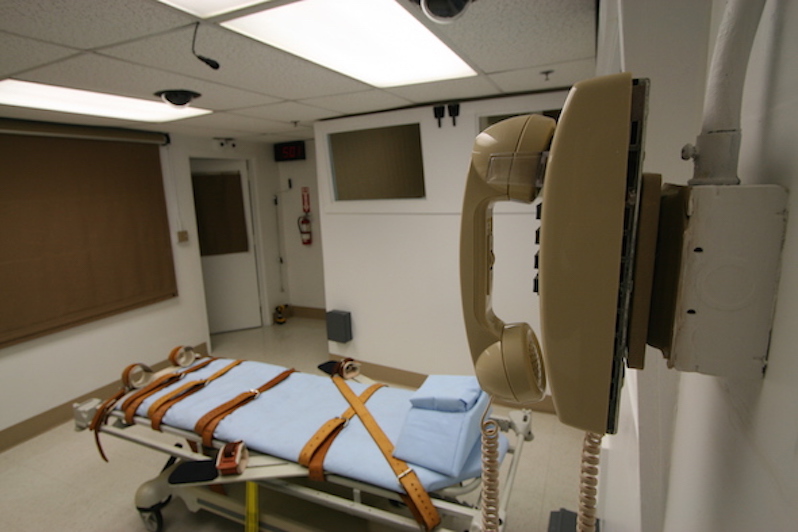Private Groups, Not Government, Lead the Charge on Prison Issues
As architects consider a ban on designing death chambers and a major pharmaceutical company stops selling drugs for use in executions, Washington sits on its hands when it comes to reform. The execution chamber of a Florida prison. (Doug Smith/Florida Department of Corrections)
The execution chamber of a Florida prison. (Doug Smith/Florida Department of Corrections)
The execution chamber of a Florida prison. (Doug Smith/Florida Department of Corrections)
The ethics panel of the American Institute of Architects (AIA) is considering prohibiting members from designing “execution chambers and spaces intended for torture or cruel, inhuman, or degrading treatment.”
Although no final decision has been announced, the proposal has been lauded by Architects/Designers/Planners for Social Responsibility (ADPSR), an architectural ethics and human rights group, as a huge leap forward on human rights,
A ban would reverse the AIA’s position from 2014, when it rejected a similar proposal, and put it in line with other professional groups’ decisions related to human rights.
The American Pharmacists Association and the International Academy of Compounding Pharmacists, for instance, voted last year to prohibit members from “providing medical drugs to be used for executions.”
More dramatically, pharmaceutical giant Pfizer announced Friday that it would ban the sale of drugs that could be used in executions, and the American Psychological Association (APA) recently voted to prohibit member psychologists from participating in national security interrogations. The United Nations has declared the practice of solitary confinement in the United States a form of torture.
If the AIA imposes a formal ban on designing new execution chambers and “spaces intended for torture or cruel, inhuman, or degrading treatment,” this will, by extension, lead to a cessation of new prison construction, including solitary confinement units. Indeed, the ADPSR is circulating a petition whereby signers agree to “not contribute my design to the perpetuation of wrongful institutions that abuse others,” and “pledge not to do any work that furthers the construction of prisons and jails.”
Instead, the AIA and ADPSR are encouraging architects and designers to use their “professional skills to design positive social institutions, such as universities or playgrounds, but these institutions lack funding because of spending on prisons.”
They’re right. Fully one quarter of the Justice Department budget goes to the Bureau of Prisons, which rehabilitates nobody, which trains nobody and which prepares nobody for life on the outside. Instead, its $7 billion budget is spent on personnel, prison construction and maintenance.
This begs the question: Where is governmental leadership on this issue? Where is Congress? Where are the judiciary committees? The deplorable state of prison conditions in this country is nothing new. Neither are the overuse and misuse of solitary confinement, the depravity of state executions and prison overcrowding.
The problem spans political parties. Certainly the Republican Congress hasn’t—and won’t—do anything to make the situation better. But neither did the Democrats when they controlled the process. Furthermore, there has been no change or reform throughout the Clinton and Obama administrations. And George W. Bush’s position on prison reform is not even worth discussing.
These recent moves by the AIA, ADPSR, APA, Pfizer and others are examples of leadership on the issues of mass incarceration and the death penalty that are largely unseen in today’s America. Congress is missing in action. The White House’s incremental steps on mass incarceration have been inconsequential. Former U.S. Attorney General Eric Holder’s Justice Department did nothing to rein in overzealous prosecutors. And judges either can’t or won’t consider alternatives to draconian sentences, especially in drug cases.
If there is going to be positive change, it will come from private organizations like the AIA and ADPSR. That’s leadership. Congress and the White House should take heed.
John Kiriakou is a former CIA counterterrorism operations officer and former senior investigator for the Senate Foreign Relations Committee.
Your support matters…Independent journalism is under threat and overshadowed by heavily funded mainstream media.
You can help level the playing field. Become a member.
Your tax-deductible contribution keeps us digging beneath the headlines to give you thought-provoking, investigative reporting and analysis that unearths what's really happening- without compromise.
Give today to support our courageous, independent journalists.





You need to be a supporter to comment.
There are currently no responses to this article.
Be the first to respond.